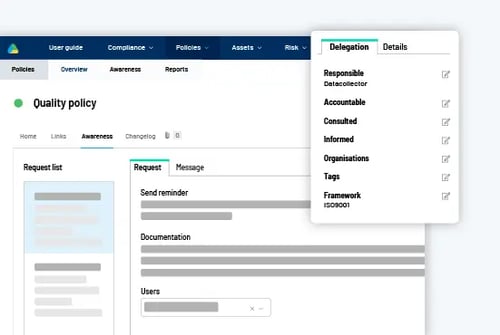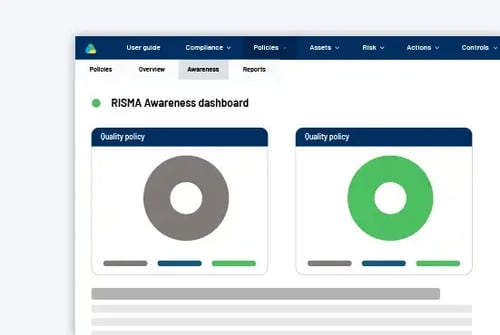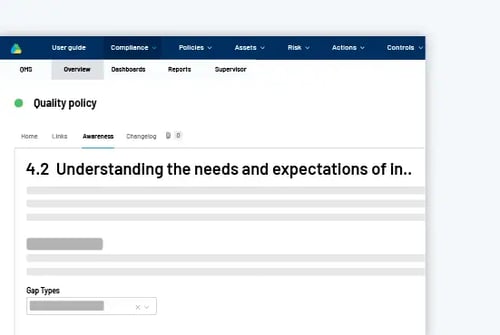QMS & ISO 9001
Quality Management System
Manage and document your ISO 9001 certification process
Gain full control of your ISO 9001 standard and work with a clear overview of quality policies and processes. Reduce manual effort and keep all documentation in one place, so you can focus on improvement, not administration.
Create a trustworthy ISO 9001 process
Achieving an ISO 9001 certification can be complex and requires structured documentation, clear process mapping, and proved compliance.
RISMA's ISO 9001 solution simplifies it all. It gives you one place to manage your quality processes, document compliance towards an ISO 9001 while ensuring you stay on top of every requirement through delegation and suggested actions.
Full visibility into your quality work
Map quality policies and processes, assign responsibilities, and set clear timelines to understand current performance. With full visibility, management can identify gaps, prioritize improvements, and strengthen your Quality Management System.


Simplify audits, revisions & due diligence
Prepare for audits, revisions, and customer reviews with confidence. With centralized, up-to-date documentation, you can demonstrate compliance, prove accountability and create awareness across your organization.
Turn ISO 9001 complexity into clarity
Be guided through complex ISO 9001 requirements with built-in questionnaires, automated gap analyses and governance reviews. The standard is turned into clear, actionable tasks to help you understand what’s needed and how to achieve it.

A GRC platform to bring the organization together
Power your organisation by connecting data, teams, action and reporting in an integrated GRC platform. Whether you deploy one, two, or all our solutions, RISMA GRC platform provides great value by boosting collaboration, increasing visibility, and saving time for everyone involved.
-
Internal audit streamlined
-
Effortlessly automate, document and report all your controls - including assessment, mitigation and monitoring in one simple platform.
-
Risk management organized
-
Define, assess, analyze and mitigate your organization’s risks and turn your insight into strategic assets.
-
Information security systemize
-
Systematize your information security and achieve full ISMS compliance – including visual overview, real-time mentoring, built-in risk assessment and seamless reporting.
FAQ
What is the difference between ISO 9001 and other ISO standards?
ISO standards aim to create common international frameworks and guidelines that ensure quality, safety, and reliability across products, services, and processes. There are many different ISO standards, each focusing on specific areas or industries. ISO 9001 is the most widely adopted standard and serves as the foundation for many organizations’ management systems. It differs from other ISO standards due to its particular focus on quality and customer satisfaction.
While standards such as ISO 14001, ISO 45001, and ISO 27001 focus on more specific areas, ISO 9001 has a broad scope and emphasizes effective process management, continual improvement, and meeting customer requirements.
Is it possible to integrate ISO 9001 with other standards, such as ISO 14001 or ISO 27001?
Yes, it is possible to integrate ISO 9001 with other standards. This is often advantageous because ISO standards share the same high-level structure (HLS), making it easy to combine them into a single system. This allows for shared policies, objectives, audits, management reviews, and risk management.
An integrated system reduces duplication of work, creates more coherent processes, and provides management with a comprehensive overview of the organization’s performance and risk profile.
How can ISO 9001 support our work with other regulations and standards?
ISO 9001’s focus on documented processes, a risk-based approach, and continual improvement provides a framework that supports compliance with both legislation and other standards.
By establishing clear procedures, defined roles, and systematic follow-up, ISO 9001 can support adherence to requirements from, for example, GDPR, CIS18, or industry-specific regulations. In this way, ISO 9001 serves as a platform that strengthens the organization’s overall compliance efforts and contributes to greater operational robustness and efficiency.